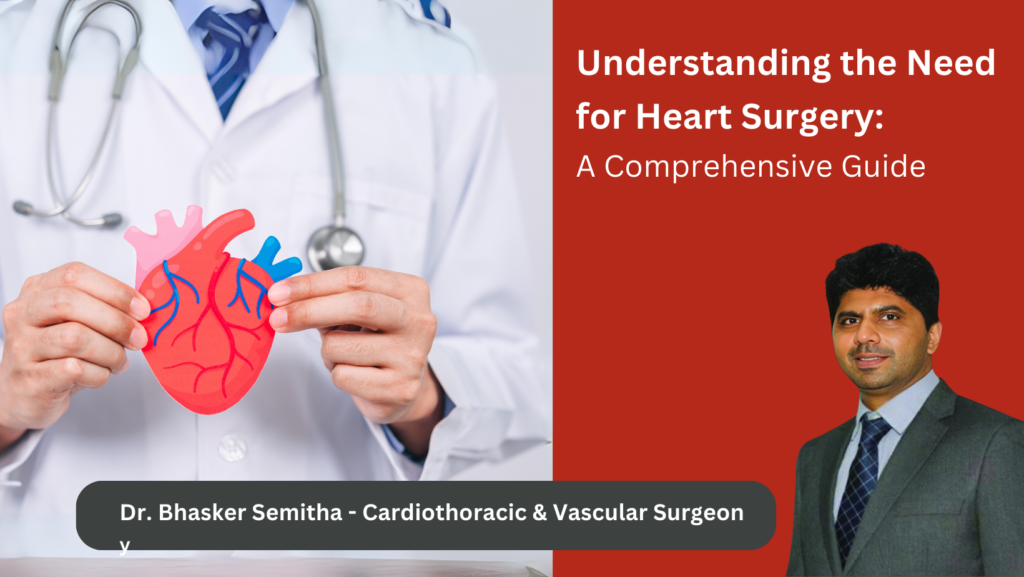Introduction:
The human heart is a remarkable organ, tirelessly pumping blood throughout the body to sustain life. However, there are instances when this vital organ may require intervention through heart surgery. In this comprehensive guide, we will explore the circumstances under which heart surgery becomes necessary, the various types of heart surgeries, and the importance of early detection and treatment.

When is Heart Surgery Required?
- Coronary Artery Disease (CAD):
- One of the primary reasons for heart surgery is coronary artery disease, where the blood vessels supplying the heart muscle become narrowed or blocked due to the buildup of plaque. This can lead to angina (chest pain) or heart attacks. Surgical procedures such as coronary artery bypass grafting (CABG) or angioplasty with stent placement may be recommended to restore blood flow to the heart.
- Valve Disorders:
- Malfunctioning heart valves can cause a variety of problems, including regurgitation (leakage), stenosis (narrowing), or prolapse. Heart valve surgery may involve repair or replacement of the affected valve to restore normal blood flow and prevent further complications.
- Congenital Heart Defects:
- Some individuals are born with structural heart abnormalities that require surgical correction. Congenital heart surgery is often performed in infancy or childhood, but may also be necessary later in life.
- Aneurysms:
- Weakness in the walls of the heart’s blood vessels can lead to the development of aneurysms. Surgical intervention may be required to repair or replace the damaged portion of the vessel to prevent rupture, which could be life-threatening.
- Heart Failure:
- In cases of severe heart failure where medications and other treatments are no longer effective, heart transplantation or ventricular assist device (VAD) implantation may be considered as surgical options.
- Arrhythmias:
- Abnormal heart rhythms (arrhythmias) may sometimes necessitate surgical procedures, such as implantation of a pacemaker or an implantable cardioverter-defibrillator (ICD), to regulate the heart’s electrical activity.
The Importance of Early Detection and Intervention:
Early detection of heart conditions plays a crucial role in determining the success of surgical interventions. Regular check-ups, diagnostic tests, and monitoring of risk factors such as high blood pressure, high cholesterol, and diabetes can aid in identifying potential issues before they escalate. Timely intervention not only improves outcomes but also enhances the quality of life for individuals with heart conditions.
Types of Heart Surgeries:
- Coronary Artery Bypass Grafting (CABG):
- In CABG, blood vessels are taken from other parts of the body and used to bypass blocked or narrowed coronary arteries, restoring blood flow to the heart muscle.
- Valve Repair or Replacement:
- This involves repairing or replacing damaged heart valves to ensure proper blood flow.
- Angioplasty and Stent Placement:
- In this procedure, a catheter is used to widen narrowed arteries, and a stent is placed to keep the artery open, promoting improved blood flow.
- Heart Transplantation:
- A last resort for severe heart failure, heart transplantation involves replacing a diseased heart with a healthy donor heart.
Conclusion:
Heart surgery becomes necessary when conservative treatments are no longer effective in managing heart conditions. Whether it’s addressing coronary artery disease, valve disorders, congenital defects, aneurysms, heart failure, or arrhythmias, advancements in medical science have provided a range of surgical options to restore and improve heart function. Early detection, proper diagnosis, and timely intervention are key factors in ensuring successful outcomes and promoting heart health. If you or a loved one are facing heart-related issues, consult with a healthcare professional to explore the most suitable treatment options tailored to your specific condition.

